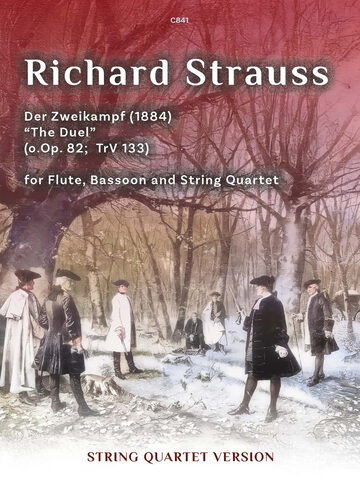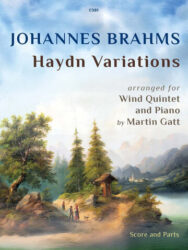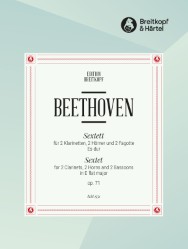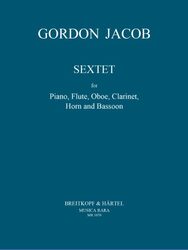Der Zweikampf “The Duel” (o.Op. 82; TrV 133)
Score and String Quartet Parts

Composer: Strauss, Richard
Editor: Nex, Chris & Frances
Arranged for: Flute, Bassoon & String Quartet
Publisher:
| Product Code: | 979-0-570-81841-9 |
| ISMN: | 979-0-570-81841-9 |
| Publishers Number: | C841 |
| Language: | English |
| Page count: | 40 |
| Condition: | New |
Richard Strauss composed the work Der Zweikampf “The Duel” in 1884. This edition is edited by Chris & Frances Nex and published in three versions:
•…
• A Piano Reduction by Chris Nex,
including solo parts for Flute and Bassoon.
C839
• A Full score with a set of orchestral parts:
2 Horns in Eb, 2 Trumpets in Bb, Trombone, Timpani and Strings.
C840: 979-0-570-81840-2
• A version for String Quartet comprising full score, with
solo parts for Flute, Bassoon, Violin I, Violin II, Viola and Cello.
C841: 979-0-570-81841-9
We are grateful to the University of Edinburgh Library Centre for Research Collections for providing us with access to a manuscript of this work. At shelf-mark Mus.M.645 lives a set of parts in the hand of an unknown copyist, annotated by John Parr (The Bassoonist of Sheffield), who also wrote a full score and second copies of the Bassoon and Bass parts.
The score is dated 1930 and the bassoon part 1934. It is here entitled merely ‘duet for flute and bassoon with orchestra’, and ascribed to R. Strauss. We are also grateful for advice from Dr. Christian Wolf of the Richard Strauss Institut in Munich, who have access to a copy of ‘der Zweikampf’ made by Cl. Schubert, but the Richard Strauss Archiv in Garmisch-Partenkirchen will not permit them to make a complete copy for us, but has permitted sample pages to be copied, confirming the identity of the music. The work appears in Franz Trenner’s Richard Strauss – Werkverzeichnis (TrV 133), the definitive thematic catalogue of Richard Strauss’s works and is listed in the Richard Strauss Complete Edition (Richard-Strauss-Ausgabe), published by Schott Music, under Orchesterlieder (Balladen) – Der Zweikampf, TrV 133 and a manuscript and early printed materials are held under Richard Strauss’s name in the Bavarian State Library archives (Bayerische Staatsbibliothek).
This piece was composed in 1884 by Richard Strauss when he was about 20 years old, alongside his Symphony No. 2 and other early vocal/orchestral works. The style and orchestration match his other early songs and ballads (e.g., Wandrers Sturmlied, TrV 53, and Notturno, TrV 239).
We would also like to acknowledge with thanks the help of Dr. Jenny Nex and Dr. Lance Whitehead of Edinburgh in deciphering the manuscript and advising on the piano reduction.
In editing the work we have corrected a few evident errors and made the dynamics consistent. There was no given tempo indication in some of the parts, but Parr added ‘Allegro moderato’, which is also the tempo indication in the Munich manuscript. He also suggested the bass pizzicato in most of the Polacca.
There are some discrepancies between the Edinburgh score and parts which we have resolved somewhat arbitrarily on musical grounds. The differences between the Munich and Edinburgh versions are mostly small as far as we can discern; the trumpets are in F in the former, but in Bb in the latter; the dance is entitled the French ‘Polonaise’ in the former, but the Italian ‘Polacca’ in the latter.
This work is also available for Flute, Bassoon and String Quartet (C841), on the basis that the brass and timpani parts of the original orchestration, while adding a great deal of colour, do not add to the harmony. For this string quartet version, in the few places where the trombone part is significant, these notes have been cued into the cello part.
R.R.P £14.95
Our Price: £12.71
Digital Download – PDF
Shipping costs: No Shipping
You might also like
-
Haydn Variations arr. Wind Quintet & Piano
£12.71 -
Sextet in E-flat major Op. 71
£20.00 -
Sextet Op. 6
£43.00



